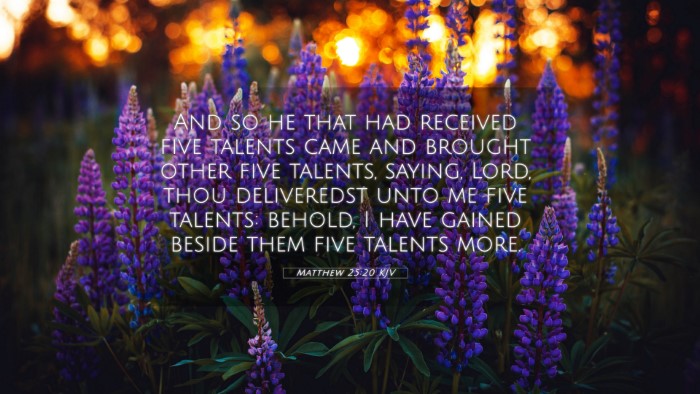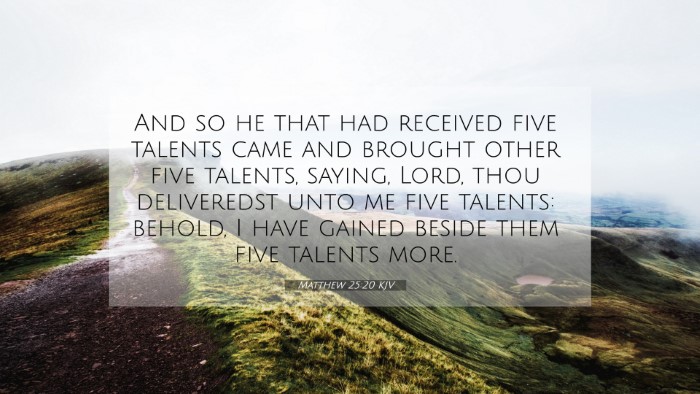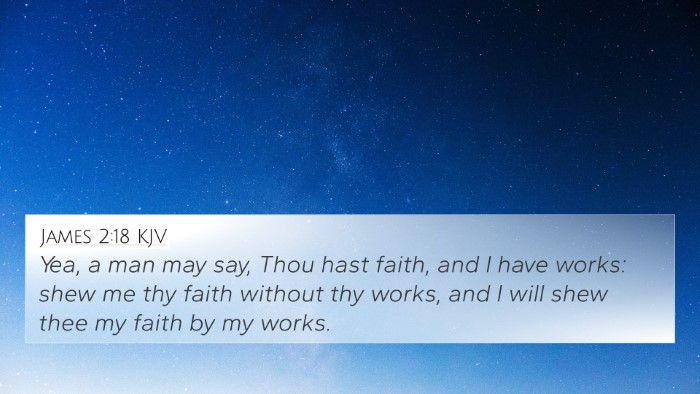Understanding Matthew 25:20
Verse Context: In Matthew 25:20, we find the parable of the talents, which illustrates the responsible stewardship of the resources entrusted to us by God. This particular verse highlights the response of the servant who was given five talents, emphasizing the increase he brought through his diligence.
Verse Text
"And so he who had received five talents came and brought five other talents, saying, 'Master, you delivered to me five talents; look, I have gained five more talents besides them.'"
Commentary Insights
Matthew Henry's Commentary
Matthew Henry emphasizes the joy of the servant in presenting his doubled earnings to his master. He reflects on the principle that faithful service leads to rewards. The increase shows not only the servant's capability but also reflects the blessings of God upon diligent effort. Henry notes that the servant acknowledges his master's initial trust and honorably presents the fruits of his labor.
Albert Barnes' Notes
Albert Barnes elaborates on the idea that the talents represent various forms of gifts from God—be it spiritual, material, or temporal. The response of the servant illustrates the expectation of productivity from what has been given. Barnes further states that the kingdom of heaven operates under the principle of accountability and productivity; those who are faithful will be rewarded abundantly.
Adam Clarke's Commentary
Adam Clarke provides a perspective on the significance of the number of talents and the accountability process. Clarke suggests that the emphasis here is on action, and he mentions that the servant’s joy in returning to his master with an abundance reflects the true spirit of service to God. He connects this accountability to the overall divine expectation that all believers should bear fruit in their lives.
Main Themes from Matthew 25:20
- Faithfulness: The servant’s work reflects the expectation of faithfulness in using God-given resources.
- Accountability: There will be an accounting for how we use our talents and gifts.
- Productivity: God desires that we not only preserve our gifts but multiply them.
- Joy in Service: The satisfaction of serving God faithfully leads to greater joy.
Cross-References
In understanding the broader biblical context of Matthew 25:20, consider the following cross-referenced Bible verses:
- Luke 19:16-19: This passage talks about a similar parable where servants are rewarded based on the increase they generate.
- 2 Corinthians 5:10: This verse reminds believers that we must all appear before the judgment seat of Christ, reiterating the theme of accountability.
- Romans 12:6-8: Paul discusses the various gifts given to believers and encourages each to use them according to their abilities.
- 1 Peter 4:10: This encourages using our gifts to serve one another, which aligns with the purpose of stewardship portrayed in Matthew 25:20.
- Galatians 6:7: Here, the principle of sowing and reaping is introduced, complementing the notion that our actions lead to consequences.
- Matthew 25:21: The next verse reinforces the reward structure and the joy of the master over faithful service.
- Proverbs 28:20: This verse highlights that a faithful man will abound with blessings, supporting the servant's doubling of the talents.
- John 15:8: Jesus emphasizes that bearing fruit glorifies God, reinforcing the importance of productive works.
- Ephesians 4:12: Here we see the purpose of spiritual gifts, which is to equip believers for service, showing the interconnectedness of spiritual tasks.
- Colossians 3:23-24: This passage encourages believers to work heartily as for the Lord, aligning with the dedication shown by the servant in Matthew 25:20.
Conclusion
Matthew 25:20 serves as a powerful reminder of the importance of being productive and faithful stewards of the gifts God has given us. Through diligent service and accountability, believers can expect to see the blessings of God. By exploring cross-references and connecting related verses, one can deepen their understanding of the biblical principles of stewardship, productivity, and faithfulness.
Tools for Deeper Study
For those seeking to enhance their understanding further, consider utilizing various tools for Bible cross-referencing:
- Utilizing a Bible concordance can help locate key themes across scripture.
- A Bible cross-reference guide can offer insights into related scriptures.
- Engaging in cross-reference Bible study can deepen your comprehension of connected themes.
- Exploring comprehensive Bible cross-reference materials will enrich your study experience.
- Utilizing a Bible reference resource aids in finding verses related to specific topics.








